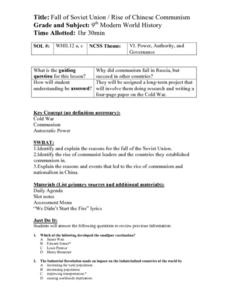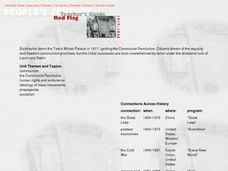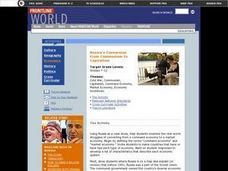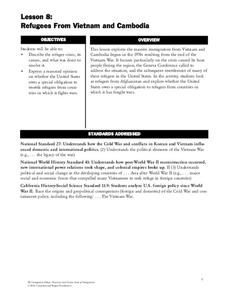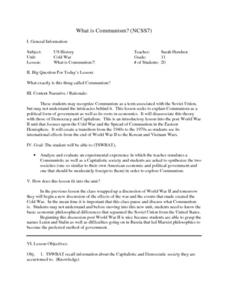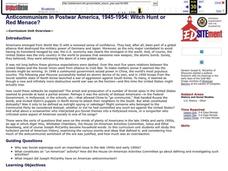Center for History Education
Speaking Freely In the Soviet Union's Autocratic Government
Speak your mind! The lesson explores the difference in free speech between the United States and the Soviet Union. Academics review the constitutions of both governments, political cartoons, and case studies to understand how freedom of...
Curated OER
Fall of Soviet Union/Rise of Chinese Communism
Ninth graders examine the reasons for the fall of communism in the Soviet Union and the rise of communism in China. They listen to a lecture and complete slot notes, listen to and read the lyrics to the song "We Didn't Start the Fire"...
Curated OER
Communist Revolution
Students examine the Russian Communist Revolution of 1917. They watch and discuss a video, take notes and answer video discussion questions, and read and evaluate newspaper articles about how Lenin and Stalin are viewed today in the...
Roy Rosenzweig Center for History and New Media
End of the Cold War
How significant was the Cold War during the 20th century? After reading and analyzing speeches by Ronald Reagan and Mikhail Gorbachev, learners consider the historical context of foreign policy decisions made during the Cold...
Curated OER
Russia's Conversion From Communism to Capitalism
Learners study Russia's conversion from a communist nation to a capitalist nation.
National Endowment for the Humanities
Soviet Espionage in America
The war against Communism and Joseph McCarthy’s place in it are the focus of a series of three lessons examining postwar America from 1945-1950. This first instructional activity asks groups to read an introduction that describes the...
Curated OER
Remembering the Forgotten War
Ninth graders examine the major events and significance of the Korean War, including U.S. involvement in the war. In this World History lesson, 9th graders read primary source materials to understand the political, social, emotional...
Constitutional Rights Foundation
Refugees From Vietnam and Cambodia
The United States may have pulled its troops from the Vietnam War in 1973, but the conflict was far from over for the citizens living in Asia at the time. An informative resource lets learners know about the wave of over 220,000...
Curated OER
The Russian Years: Back in the USSR
Students examine communist Russia. In this lesson on changes in politics, students work in small groups to compare and contrast soviet communist era citizen rights to those of the US. They participate in discussion of a film and create a...
Curated OER
What is Communism?
Eleventh graders explore Communism. They explore Communism's roots in economics and discuss the spread of Communism in the Eastern Hemisphere. They evaluate a Communistic and a Capitalistic society. Students reflect upon the positives...
Curated OER
The Cold War
Tenth graders explore the origins of the Cold War. For this Cold War lesson, 10th graders analyze selected songs and identify what historical events they reference. Students create a musical collage or timeline for the period...
Center for History Education
Cold War Case Files: The Rosenberg Trial - Was Justice Fairly Served?
The Rosenbergs—executed for their role in a Soviet-era spy ring—continue the captivate the American imagination. Using a history lab format, young historians examine the trove of documents associated with the case, including photographs...
Center for History Education
The Cuban Missile Crisis
Cold War tensions led to hostile actions. Scholars use primary sources to understand the Bay of Pigs and the Cuban Missile Crisis during President Kennedy's administration. The lesson provides primary sources and a graphic organizer to...
Curated OER
The Early Tensions of the Cold War
High schoolers uncover the roots of the Cold War. In this Cold War lesson, students research the political philosophies of the Soviet Union and the United States during the era as they define key vocabulary and discuss government...
Curated OER
1950's Popular Culture
Learners gain a basic understanding of Capitalism and Communism, the ideologies that fueled the United States and the Soviet Union during the Cold War.
Curated OER
Should Britain Leave the EU?
Tenth graders analyze the reasons to why Great Britain wants to leave the European Union. In this European Union activity, 10th graders read an article and answer comprehension questions. Students participate in a debate on the European...
Curated OER
L I V I N G U N D E R C O M M U N I S M
Learners examine a communist regime and what it means to live within a communist societyl.
Curated OER
South Koreans in the Vietnam War
Young scholars consider why South Koreans fought in the Vietnam War. In this Vietnam War lesson, students engage in an activity through which they investigate why South Koreans fought in the Vietnam War and how their...
National Endowment for the Humanities
The House Un-American Activities Committee
Was the House Un-American Activities Committee justified in investigating subversive influences in the entertainment industry? Part two of the three-part series of lessons that examine the anti-communism movement after World War II,...
John F. Kennedy Presidential Library & Museum
Analyzing the Inaugural Address
Get high school historians to step outside their own shoes by responding to JFK's inaugural address from the perspective of a civil rights activist, a soviet diplomat, or a Cuban exile. After a class discussion about the address,...
Curated OER
Capturing the Reader With Vivid Images
Learners examine how the author tries to capture the reader's imagination immediately, through imagery--and hold on to it. They locate Ukraine on a world map and understand Lenin's role in the establishment of Russian communism and the...
Curated OER
The Role Of NATO
High schoolers examine the role of the North Atlantic Treaty Organization (NATO). In this NATO lesson, students research the Truman Doctrine, the Marshall Plan, Winston Churchill's "Iron Curtain" speech, and the Berlin airlift and how...
Curated OER
Witch Hunt or Red Menace? Anticommunism in Postwar America, 1945-1954
Students investigate what constitutes an "un-American" activity and why Soviet espionage was such an important issue in the 1940's and 1950's. Joseph McCarthy's impact on American anticommunism is examined in this lesson. There are three...
Curated OER
Milestones in the Space Program
Students brainstorm names of astronauts from NASA space missions. They are explained that the Cold War was not actually a war but pervasive tension that existed between the United States and the Soviet Union for several decades...

